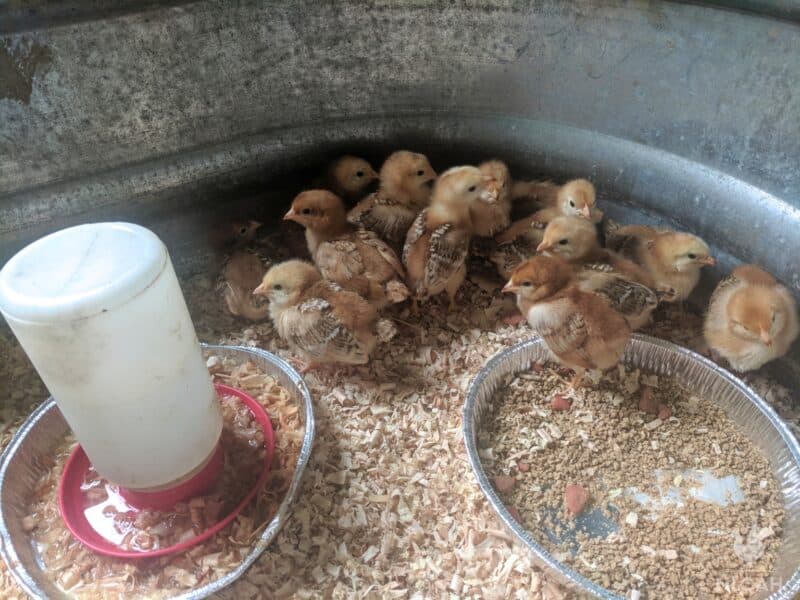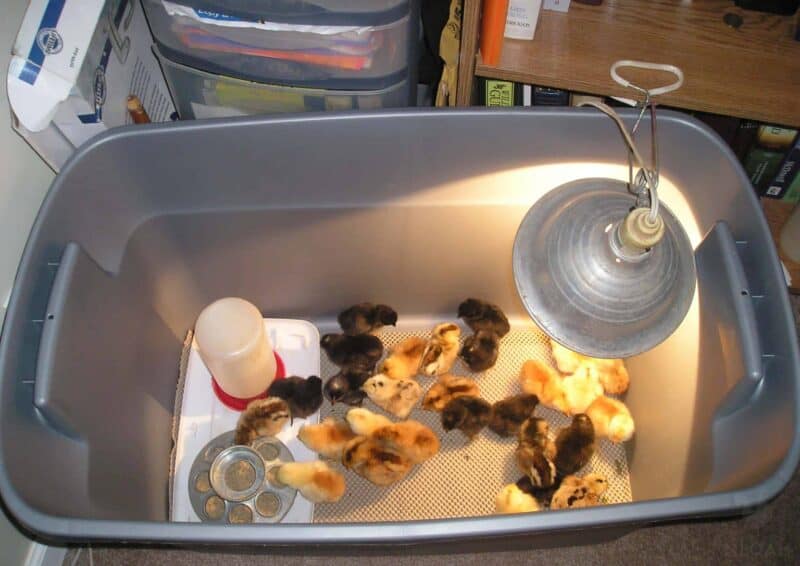I don’t know about you, but for me, one of the best times around the homestead is when I have a batch of precious, sweet little chicks in the brooder box. I just love the little things.

But if you are new to keeping chickens and going through the same thing you probably noticed that your chicks are chirping, and sometimes they chirp a lot, and loudly. It can be a little alarming. So, why are young chicks chirping so much?
Your baby chicks might be chirping because they’re too cold, too hot, in pain, or suffering from an injury or illness like coccidiosis, or pasty butt.
It’s totally natural for chicks to chirp, but you need to remember that this is how they get your attention, and anything except soft, content peeping is a sign that you need to investigate immediately.
Chicks are extremely sensitive, and delicate, and it doesn’t take very long at all for minor issues to turn into life-threatening problems. Don’t be scared, but keep reading so you’ll know what to check and how to react…
Constant, Loud Chirping is a Warning Sign
The first thing you need to know about chicks is that they’re a lot like infants when it comes to the noises they make: Soft, content sounds happening at a steady pace mean that nothing is wrong.
On the other hand, shrill, insistent and rapid chirping, especially from all of your chicks, means that something is definitely wrong and you need to intervene!
By paying attention to your checks you’ll start to understand the difference between the two instinctively, even when it comes to the overall tempo and volume of the individual chicks.
In any case, should you notice a change you must investigate at once assuming your chicks aren’t sleeping.
What are the Major Causes of Distressed Chick Chirping?
It’s always best to look for the most likely and most dangerous problems if you notice that your chicks are chirping loudly and continuously. Sometimes, the problem can be subtle and you’ll have to look closely to verify what the issue is.
The following are the most common, and most serious, causes of loud, insistent chirping in baby chicks.
Cause #1: Too Cold
Baby chicks are incredibly vulnerable to cold, and being chilled for even a short period of time can severely impact their overall health and development.
The moment that chicks start to get uncomfortable due to cold, they’re going to crank up the volume and the frequency of their chirping.
Remember, when your chicks are in the brooder box, or any other environment, during the first few weeks of their life the temperature needs to be between 90° and 100° Fahrenheit (between 32° and 37° Celsius) depending on their stage of development.
Especially when they are very young “cool” temperatures can kill them because they aren’t fully developed and don’t have feathers to help them regulate their body temperature.
There are many ways to provide heat, and heat lamps are some of the most popular.
You’ll always want to have a thermometer inside the brooder box, and preferably multiple, to accurately measure the temperature range and a backup heating system is a good idea in case one goes out.
Even so, you have got to be very careful that you don’t make the chicks too hot. More on that in a little while.
Cause #2: Coccidiosis
Coccidiosis is a terrible disease that affects chickens, one caused by a protozoan parasite. It is extremely common, and in fact, it is so common that you can expect most chickens to develop at least partial immunity to it as they grow.
However, coccidiosis is devastating to chicks and is also one of the leading causes of death in them. That’s because, again, they aren’t fully developed and don’t benefit from the immune system that adults have.
If you notice a particular chick chirping more loudly than all the others, or one that isn’t acting quite right, look it over closely for any signs of injury and make sure that it has access to water, food, and that it’s clean.
If all of those checks come back okay, you should assume that it is infected with coccidiosis and act to treat it.
Early intervention can save a chick’s life!
Cause #3: In Pain
Individual chicks may also chirp loudly and persistently if they are injured or if something is causing them pain. This could be as simple as a sliver of bedding poking them in a place that they can’t reach, or something as gnarly as a broken bone or other injury.
Always check a chick over cautiously and gently but thoroughly if you notice it chirping insistently, especially if it is showing trouble moving or reluctance to get up.
If the chick is unable or unwilling to eat and drink even when you help it, there might be bigger problems. If you want to try and save the chick, you may need to consult your vet.
Cause #4: Pasty Butt
A nasty and preventable but very common cause of illness and sometimes death in chicks is pasty butt.
Pasty butt, also known as a blocked vent, is what happens when droppings get mashed into the vent of the chicken and then stick there or, sometimes, harden in place.
This then prevents the passage of other waste which will accumulate quickly inside the intestines of the chick and eventually poison them with lethal results.
This tends to go bad very quickly if it is not rectified, but the good news is that it’s easy to cure most of the time. Some warm water and, occasionally, chicken-safe soap is all that is needed to remove the blockage.
Note that you might need to gently swab out the opening to fully clear it. Once it is cleared, the chick should return to normal quickly.
Keep in mind that chicks can sit down on droppings and mash them back into their vent, so this is yet another reason why you must stay on top of keeping their brooder box or other enclosure very clean and fresh.
What are Some Other Causes of Chirping?
Those reasons we discussed above are the most common causes of loud, persistent chirping in your chicks. They also happen to be the most serious! However, there are other reasons you should know about and check on immediately once you have ruled out those above.
Your Chicks are Hungry
Not much to it! Assuming all is well with your chicks physically there are probably just hungry. Have you been feeding them enough? Have you made sure that all chicks have access to food?
Once they get enough to eat, they should settle down at once assuming, of course, they’re warm enough and otherwise comfortable.
Your Birds are Thirsty
Just like with food, above, your chicks might chirp very loudly if they are thirsty, and this is another problem you’ll have to take care of right away.
Don’t rule it out just because you know there is water inside their box or other enclosure: have you checked the water? Is it contaminated or did it get spilled? Did it dry up?
If they have a dropper-style waterer, does the water flow freely or is it clogged? Don’t assume, find out and make sure. Chicks can dehydrate rapidly even in ideal circumstances and they must have continual and completely unimpeded access to fresh, safe water at all times.
They are Too Hot
Just like with getting too cold, it is possible for your chicks to get too hot, although this is typically less likely assuming that your heat source is functioning correctly and you’ve been monitoring the temperature with thermometers.
Remember that your chicks, all of them, must have enough room to get away from the heat source too when they want to cool down.
And even then, they must have enough room where they aren’t too crowded because that will heat them up also.
If you check the temperature and they look good see if your chicks are huddled up and pecking or fussing at each other. If they are, it means they’re likely still too hot. Do what you need to do to give them more room and then re-establish a comfortable temperature.

Chicks are Scared
Chicks are tiny and incredibly delicate. They are also a delicious snack for basically every carnivorous animal on earth, mammal, reptile, or avian. Accordingly, these precious little things are incredibly nervous and highly sensitive to danger.
Sure, they might be used to you and happy to see you, but the presence of other people might frighten them. If you have any pets or other animals nearby, even if they can only see them, this might be causing them distress and alarm.
Even something like loud sounds and reflective services could upset your chicks, as can the presence of a shadow that blocks the light.
Make it a point to give your chicks a secure, quiet, calm environment and always interact with them in a gentle and comforting way. Remember that stress alone can potentially kill a chick if they get scared enough!
Remember: Chicks Chirp Constantly but Softly When they’re Happy
Lastly, it is important to remind you that chicks are going to chirp more or less all the time. If they are awake, and not dying, they are probably chirping.
But remember what I said above: contented, soft peeping is nothing to be alarmed over if the chicks are acting right and seem alert and healthy. It’s only when the chirping gets shrill and insistent that you need to worry.
Tom has lived and worked on farms and homesteads from the Carolinas to Kentucky and beyond. He is passionate about helping people prepare for tough times by embracing lifestyles of self-sufficiency.
